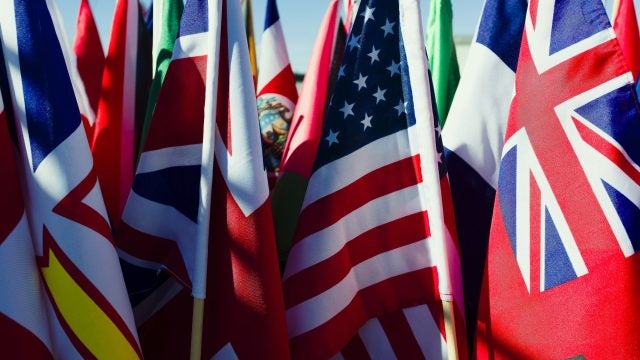
Title: The Challenge of Crafting a Global Regime for Plastic Pollution
Addressing plastic pollution represents an extremely complex and multi-faceted governance problem, demanding a range of novel regulatory approaches. The broad utility, environmental persistence, wide-ranging harmful impacts, and global supply chain of plastics demand an urgent shift towards circularity in its design, production, recycling, and reuse. This shift will require reliance upon a complex mix of formal international rules and informal transnational standards, together creating a vibrant global market in recyclable and recycled plastics. Due to the fragmented existing legal framework, any new international rules will need to incorporate robust procedures for inter-sectoral coordination.
Introduction
While the full extent of the environmental impacts associated with waste plastics and microplastics is becoming ever more clearly understood, plastic use and plastic waste leakage into the environment continue to grow exponentially. An estimated 21 million tons of plastics leaked into the environment in 2022, and the OECD estimates a 50 percent increase in such leakage by 2040 under a business-as-usual scenario. The impacts of this trend include harm to wildlife and ecosystems, contribution to chemical pollution loads, and negative consequences for food supply and human health. In addition, plastics are estimated to have contributed 3.8 percent of total global greenhouse gas (GHG) emissions in 2022, mainly due to increased reliance upon energy recovery as a waste management option.
There are several reasons why this challenge of plastic pollution presents a truly “wicked” problem in terms of its technical difficulty, evolving nature, and complex interdependencies. Firstly, plastic use is ubiquitous–due to utility and convenience–even though the material itself is highly environmentally persistent and damaging: when it eventually degrades, it merely breaks down into microplastics and hazardous chemical compounds. Secondly, “plastics” comprise a bewildering range of synthetic materials, including plant-based materials, making segregated collection and efficient recycling extremely challenging. Thirdly, the plastics supply chain and the business of treating or managing plastic waste are truly global in structure, creating significant jurisdictional problems for policymakers and regulators. Finally, plastics pollution intersects with a broad range of traditional sectoral fields and sub-fields of regulatory activity, including waste management, chemicals pollution, marine pollution, and biodiversity conservation; as such, the existing applicable legal framework is highly fragmented and prone to overlap and incoherence.
These aspects are relevant as the global plastics treaty regime–under the auspices of the UN Environment Programme (UNEP)–begins to emerge, and its key provisions are being negotiated. The third session of the Intergovernmental Negotiating Committee (INC-3) to develop the plastics treaty saw differing interpretations among delegates of the 2022 mandate in designing rules “that address the full lifecycle of plastics.” In preparing a Zero Draft, some INC-3 delegates favored downstream measures to eliminate plastic waste, another group sought measures addressing plastic production, and another faction emphasized the need for a standards-based regime to govern plastic products. Thus, there does not yet exist any clear consensus regarding how far “upstream” regulatory intervention on plastic pollution should extend.
Despite the lack of current consensus, these recent attempts to address plastic pollution render two truths self-evident. Firstly, any regulatory framework, including the global treaty envisaged by UNEP, must accommodate intense “regime interaction” with other specialist sectoral international regimes, meaning structured communication among different functional areas of legal specialization and institutional activity with a view to the resolution of conflicting norms between regimes. Secondly, in the medium-to-longer term, global regulation must ultimately aim to pursue circularity in the plastics materials chain, whereby products and the plastics contained therein are reused or recycled indefinitely rather than allowed to enter the waste stream.
Regime Interaction
Specifically, an approach that integrates pre-existing treaties and policies is imperative to effectively tackle the multifaceted challenge of plastic pollution, as failure to do so will result in further fragmentation of the applicable legal framework, rendering the rules confusing and ineffective.
The challenge of governance regime integration is exemplified by the regulatory efforts surrounding marine plastic pollution (MPP). Despite more than 50 years of history of attempts to correct the problem via international marine environmental law, along with elaborate soft-law frameworks, commentators point out that legal measures have abjectly failed to address problems of land-based sources of marine pollution, including MPP. This disappointment can largely be attributed to problematic regime interactions. Although the vast majority of plastic waste entering the oceans is carried by rivers, with as much as 90 percent estimated to come from 10 major river systems, neither Articles 207 and 213 of the UN Convention on the Law of the Sea (UNCLOS) nor Article 23 of the UN Watercourses Convention and Articles 2(6) and 9(4) of the UNECE Water Convention has had any ability to regulate or stem this pollution coming from the rivers.
Moreover, these problems are not limited to interactions with river pollution, as steps to tackle the effects of MPP have also been adopted under other specialist regimes of international environmental law. These include early technical guidelines in the Basel Convention, Convention on Biological Diversity provisions on preventing and mitigating the impacts of marine litter on marine and coastal biodiversity and habitats, and Bonn Convention on Migratory Species measures on marine debris, including plastic waste, microplastics, and abandoned fishing gear. Provisions of other international instruments may also be applicable, including Annexes to the Stockholm Convention on Persistent Organic Pollutants that list certain chemicals used in the production of plastics for control or restriction, such as PCBs. Similarly, Article 5(f) of the UN Fish Stocks Agreement creates obligations regarding lost and abandoned fishing gear. Together, these various frameworks demonstrate the importance of understanding regime interactions when it comes to plastic regulation. To date, there are few, if any, arrangements in place for coordination between the Secretariats of these key international conventions concerning efforts to address MPP and its impacts.
Circularity
In addition to regime interaction, the challenges associated with MPP also highlight the need for a heightened emphasis on circularity in the emerging plastic treaty regime. Despite this rich montage of relevant rules and restrictions, many applicable for decades, the MPP problem has not only continued but also accelerated. Thus, it seems obvious that few physical options remain for addressing plastic pollution once plastic waste has entered the riverine or marine environments. Specifically, the MPP challenge demonstrates that the problem cannot be addressed effectively at the downstream sectoral level of the receiving environmental medium or at the level of waste materials management.
Yet, although effective waste management practices and standards further “upstream” might appear to offer a better solution, leakage to the environment is inevitable, especially in less developed countries and countries, to which many developed countries export their plastic waste for treatment or disposal. Additionally, the use of energy recovery technologies to treat plastic waste is an increasingly significant driver of GHG emissions. Hence, it appears that a more “circular” approach to the plastics materials chain at the upstream level is the only viable longer-term option. Under such an approach, the value of plastic products and materials is maintained indefinitely by keeping them in circulation through their reuse and repeated recycling, which solves the leakage problem by diverting plastics from the waste stream altogether.
The transformation envisaged by the “circular economy” requires a corresponding transformation in policymaking at the level of domestic regulatory frameworks. For example, the EU has already made some progress in elaborating such a multi-faceted, yet integrated, policy-making strategy, which aims to promote improvements in the design and production of plastics to ensure greater recycling and reuse. The EU plans to invest heavily in research and innovation to develop less hazardous plastic materials and more efficient recycling processes and to boost demand for recycled plastics. In doing so, the EU is contemplating the “significant prospects for developing an innovative circular plastics industry worldwide.”
The EU strategy on circularity in plastics demonstrates an openness to regulatory innovation, an understanding of the global nature of the value chains involved in the production and supply of plastics, as well as the management of plastic waste streams. This approach establishes a new role for informal transnational governance measures largely located in the private sector, which can harness environmental concerns. For example, the strategy acknowledges the need to stimulate the market for more sustainable plastics. It also proposes harmonized rules on defining and labeling compostable and biodegradable plastics and the use of global certification schemes to attest to the quality of recycled plastics, thereby encouraging their uptake by industry.
Thus, as shown by the EU, these informal frameworks delegated to the industry level tend to be more responsive, flexible, and accessible than formal state-led environmental standards, which are subject to the difficulties of coordination among diverse self-interested sovereign actors. Their informal nature also renders them applicable beyond jurisdictional borders and effective in regulating long and complex commercial value chains.
Transition
However, to achieve the goal of circularity, progress will need to occur globally, not just in Europe. Though a complete transition to circularity in plastics is undoubtedly necessary in the medium-to-longer term, the systemic changes required will take considerable time, likely decades. Therefore, it remains an immediate imperative to craft a comprehensive global regime addressing pollution across the full life-cycle of plastics while also promoting a more fundamental transition.
Robust institutional and procedural arrangements will be required to ensure effective communication and coordination between relevant treaty bodies and, thereby, coherent and coordinated plastics governance. This might take the form of a permanent dedicated working group comprising representatives of the secretariats of mall key relevant conventions, and/or measures to ensure the active involvement of all such secretariats at any Conference of the Parties of any of the conventions where measures to address plastic pollution are to be discussed. Such coordination should not prove to be beyond the capacity of the international community.
Conclusion
While one can only welcome current efforts to craft a long-overdue comprehensive global treaty on plastic pollution, such an instrument must chart a clear path for the long and difficult transition to a circular economy in plastics. By embracing the corpus of transnational governance standards emerging in this field, such a treaty can harness the power of markets and green consumers to accelerate the transition. In addition, the treaty must facilitate effective “regime interaction” to avoid inefficient overlap, duplication, and inconsistency in applicable legal frameworks.
…
Owen McIntyre is a professor at the School of Law, University College Cork; Director of the LL.M. (Environmental & Natural Resources Law) Programme; and Co-Director of the Centre for Law & Environment. His principal research interests lie in the field of International Environmental and Water Law. He is the General Editor of the Journal of Water Law and has served as the inaugural Chair of the IUCN World Commission on Environmental Law Specialist Group on Water and Wetlands, as a panel member of the Project Complaints Mechanism of the European Bank for Reconstruction and Development (EBRD), and as a member of the Scientific Committee of the European Environment Agency. He holds visiting positions at the University of Dundee, Charles University Prague, Xiamen University, and Wuhan University.
Image Credit: Contiki
Recommended Articles

On May 20, 2025, the World Health Assembly unanimously adopted the World Health Organization (WHO) Pandemic Agreement, an international treaty designed to strengthen pandemic prevention, preparedness, and…

As the Trump administration proposes a sweeping overhaul of the US foreign assistance architecture by dismantling USAID, the Millennium Challenge Corporation (MCC), and restructuring the State Department, there is an…

The Trump administration’s abandonment of allies and embrace of Putin’s Russia has raised pressing questions about whether Estonia, Latvia, and Lithuania can continue to rely on NATO for…